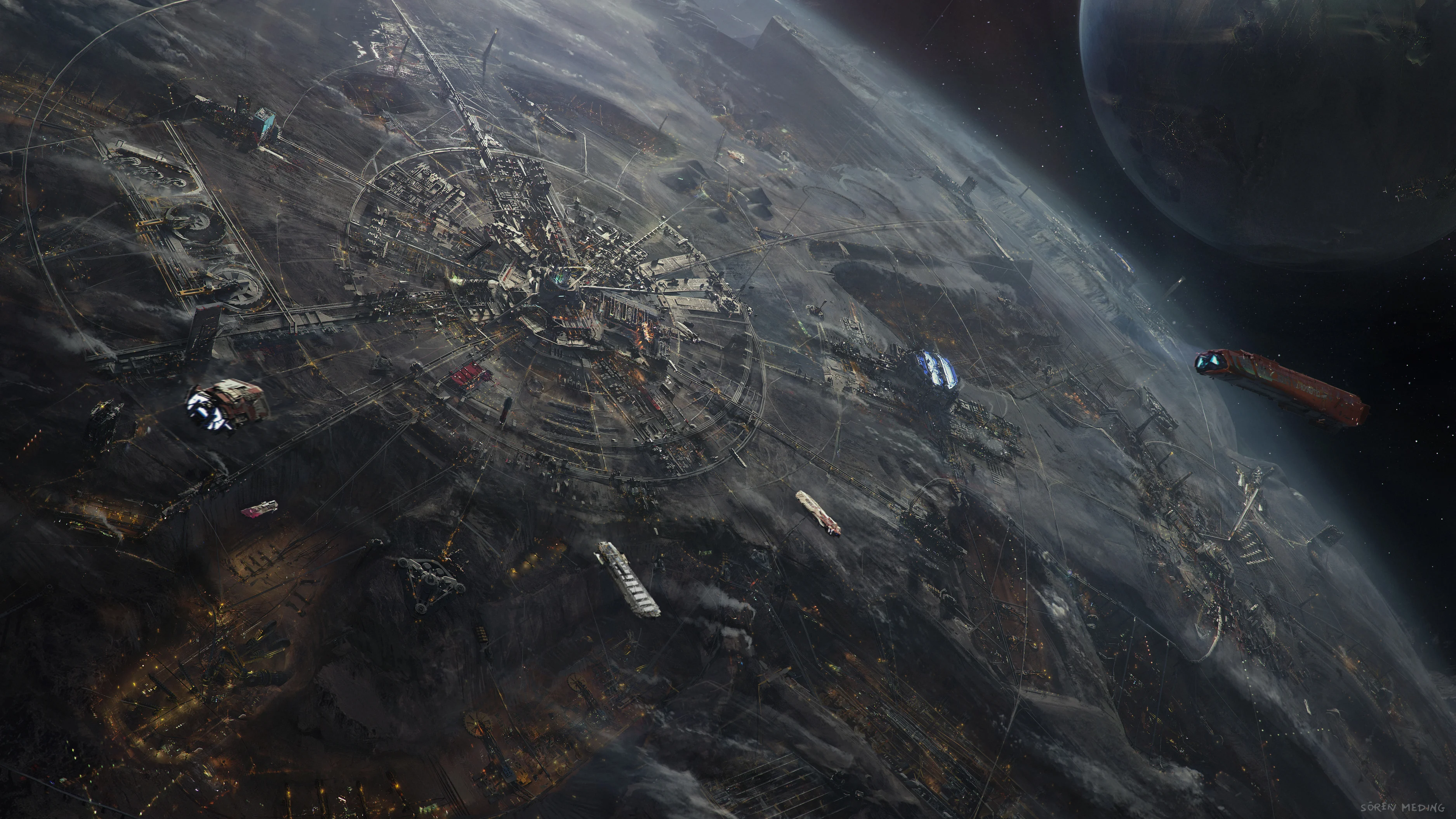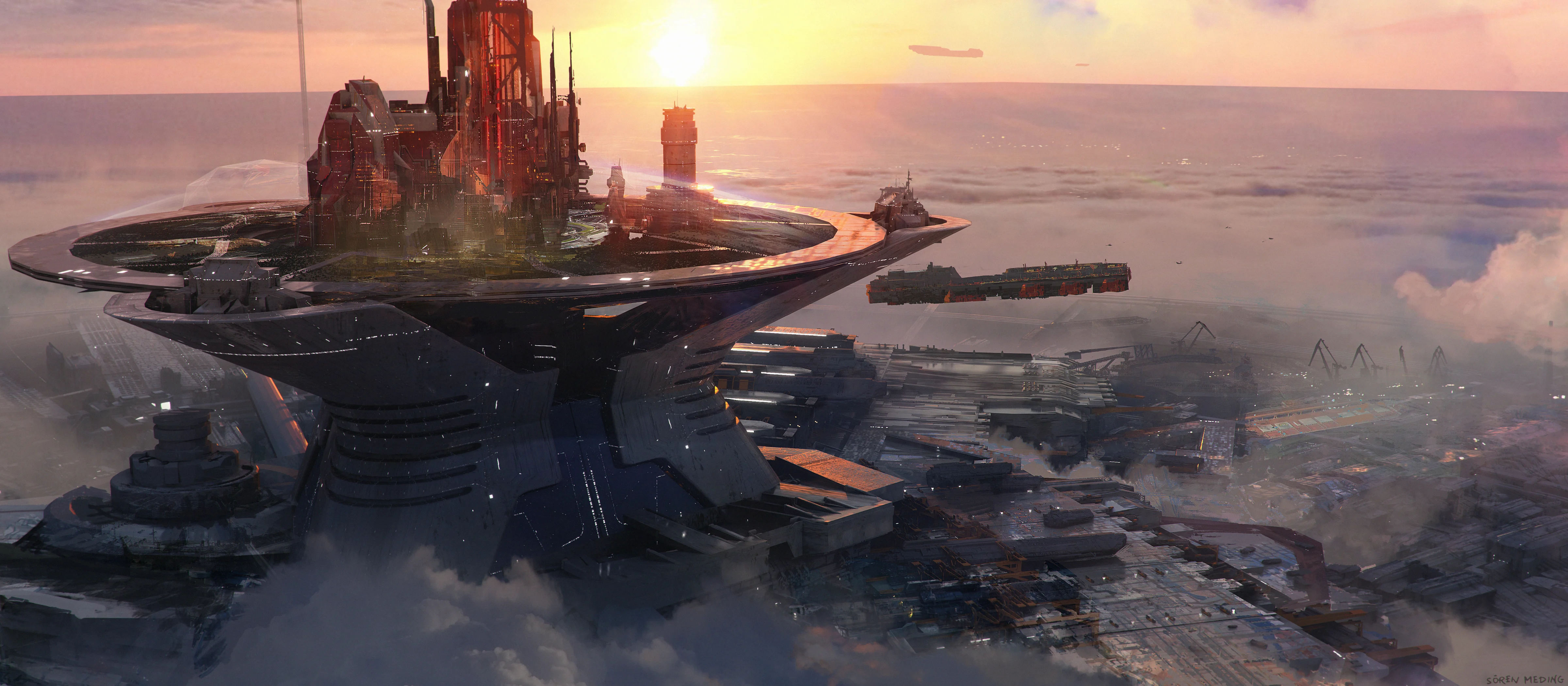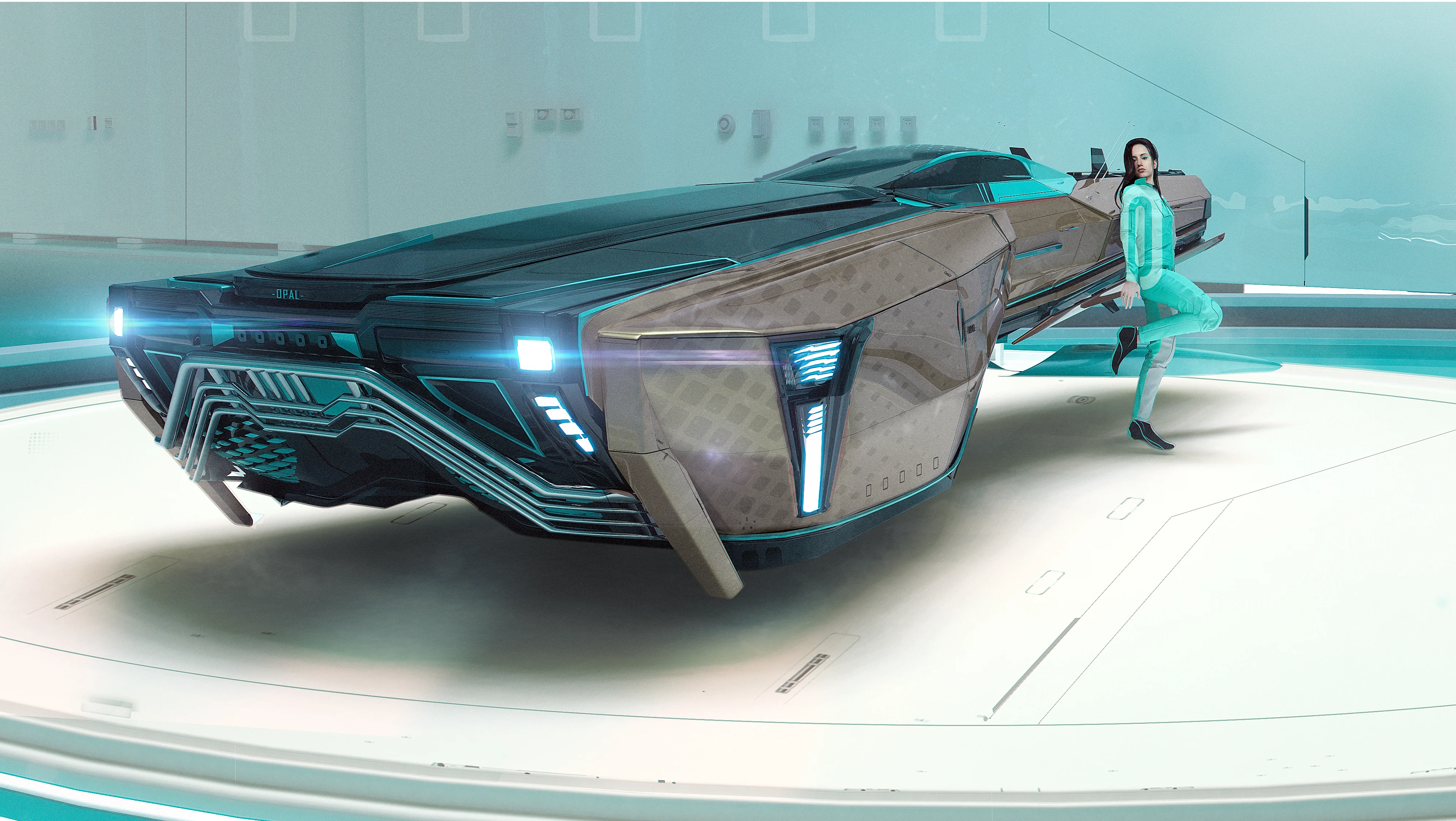Several heavily armed security guards stand at the entrance to the Solana Hacker House in a relatively empty section of Miami’s Wynwood neighborhood one evening in early April, the same week as the big Bitcoin conference taking place in South Beach.
These aren’t your everyday security guards. With muscles rippling on top of muscles and bulletproof vests covered in ammunition, their intensity belies the very benign scene behind the metal detectors – essentially a big group of nerds discussing blockchain development in an open-air event space punctuated by Fun Dimension, a giant arcade.
But those nerds might be holding lots of crypto.
This article is part of Road to Consensus, a series highlighting speakers and the big ideas they will discuss at Consensus 2022, CoinDesk’s festival June 9-12 in Austin, Texas. Learn more.
The nerd I’m here to meet is Michael Wagner, co-founder and CEO of Star Atlas, a massively multiplayer online (MMO) game his team has been building on the Solana blockchain. It made its debut in January.
It’s an extremely ambitious project and still in its earliest stages (about 160,000 people are in the Star Atlas channel on the Discord messaging app so far, Wagner says). Players can access the game’s first module including limited gameplay and NFT (non-fungible token) asset buying.
Star Atlas encompasses a sci-fi plot-line unfolding in the year 2620, with graphics fitting for a Triple-A (read: high-budget) game. Three warring factions compete for valuable resources on the discovered planet Iris, using the in-game currency Atlas to purchase ships and other virtual items to meet their goals and live their virtual lives.
The game’s meta-currency is Polis, which players can use to determine the game’s governance through layers of hierarchical decentralized autonomous organizations (DAOs). From local to regional to top level, they mimic something like the structure of federal, state and local governments.
“We think about what we’re building at Star Atlas as almost like an independent nation-state,” Wagner says after finding me between two separate sets of security guards, one patrolling the Hacker House’s entrance and the other the VIP area (which we can’t enter even though Wagner has credentials, since I don’t and security isn’t taking any chances).
People will even be able to earn a living through Star Atlas’ play-to-earn capabilities, à la Axie Infinity but with endless possibilities that the players can create themselves. If players can’t afford or earn enough Atlas to buy their own spaceship, someone else in the game may decide to become a sort of Uber driver in space, shuttling them from one planet to another in exchange for the game’s tokens, which they can ultimately convert to fiat if they want.
“We’re building a global country of sorts and a virtual economy for people to participate in this grandiose vision,” Wagner admits, “but there’s real potential there.”
Who is Wagner to assert such a grandiose vision? In red pants and a white Miami-themed Solana shirt covering broad shoulders, he introduces himself first as a “huge advocate for bitcoin” with a disarming smile as we take a seat at an umbrella-covered wooden table (surrounded by other umbrella-covered wooden tables on a sea of fake grass).
Wagner has only very recently relocated to Miami from another party city, Las Vegas – but he’s here to build his game.
“There’s energy and a vibe here that’s very supportive and conducive to building in crypto,” he says. The Solana Hacker House alone attracted somewhere between 1,000 and 5,000 people on the day we meet, he estimates.
Pablo Quiroga, Atlas’ co-founder and chief revenue officer, moved to the city a few months prior, and Estefan Ramirez Vazquez, the company’s newly hired head of growth, lives in Miami now, too.
But the company is global, with nearly 200 employees spanning 26 countries, from New Zealand to central Africa.
“Discord is essentially our headquarters,” Wagner explains. Though it’s difficult to attract the limited number of talented, in-demand Rust engineers to any given blockchain company, Star Atlas hasn’t had much of a problem. Leadership gets emails daily, Wagner says, from qualified engineers asking to work with the team, and has so far hired 45, most of whom predominantly develop blockchain products.

(Star Atlas)
***
Wagner himself is not a software engineer. “Gaming and PC building was my way into crypto,” he says.
In fact, he and his high school friends in the 1990s were so into gaming and computers they formed a group around their shared passion called the LANarchists. (“We were all really nerdy … I’m actually proud of it,” he says, looking like he’s fully grown out of his nerdom and started regularly hitting the gym.)
About a decade post-high school, one of the guys from that group told Wagner about crypto and mining using graphics processing units.
“He had built this milk crate rig with three GPUs in it,” Wagner recalls. “And I was looking at that, like, this is definitely something I can do.”
At the time, Wagner was working in traditional finance, essentially managing portfolios. He immediately saw the parallels between the markets he was working in and the emerging markets in crypto. By 2015, he had left his “regular job” and switched to working in crypto full time, starting his first company in Nevada in 2016, called Tokes. From the name, it’s easy to tell that the company sat at the “intersection of crypto and cannabis,” Wagner describes – an especially tricky intersection at the time.
“It was a tough sell,” he says. Even though cannabis had become legal in Nevada, it remained illegal on the federal level, meaning retail companies couldn’t use the traditional banking system. Providing those companies with a crypto token seemed like a natural solution to the problem, but crypto was stigmatized back then, coming off its underground druggy associations with Silk Road, and cannabis sales licenses were limited in Nevada. No one wanted to risk losing their own licenses by accepting cryptocurrencies.
Wagner and his co-founders, Daniel and Jacob Floyd (now both at Star Atlas), opted for a different route. Instead of going to cannabis retailers, they went straight to the Nevada state legislature, meeting with dozens of policymakers to ultimately pass Assembly Bill 466.
“This introduced an optional, tokenized, closed loop financial ecosystem for cannabis,” Wagner says. “What we would effectively do is create an in-state, private stablecoin.”
Fatefully, that bill passed not long before COVID-19, and just when Tokes was picking up momentum, the team’s work was put on hold. Wagner and his team members started asking themselves, “What else is going on in crypto right now?” The answers were “DeFi (decentralized finance), NFTs and blockchain gaming,” Wagner says. “And we’re all gamers.”
Plus, as an active yield farmer in DeFi, Wagner saw the inherent gamification in borrowing and moving funds to find the optimal spread. He goes so far as to call DeFi “the first gaming product in crypto … It’s not running around with a sword and killing a monster, but there were some gameplay mechanics.”
Wagner credits Daniel Floyd, now Star Atlas’ chief product officer, for much of the game’s concept. He’s largely responsible for the plot centered on the three fighting, interplanetary factions, the alien-esque Oni, the armored Uster, and the humanoid Mud. But their first company Tokes is still breathing – active but “somewhat dormant,” as Wagner puts it. They even plan to possibly incorporate it into Star Atlas.
“We are going to be bringing Tokes as a craft cannabis community into the metaverse,” Wagner says, by creating a product players can “use in the game.” When I ask if there’s an “IRL (in real life) component” to that, Wagner elaborates.

(Star Atlas)
“There’s a very real potential and high likelihood that people start consuming their digital purchases through 3D immersive environments instead of shopping on a 2D website. You’re logged into your avatar, maybe you’re playing a game, maybe you’re hanging out with some friends, and while you’re sitting there socializing, you’re also going through your shopping list,” he says. “Then you pay with digital currency, and it gets delivered to your physical residence. There’s nothing preventing that from happening.”
***
Buying physical cannabis in a virtual store in Star Atlas is still ways away from becoming a reality. In a different section of the Hacker House, past empanada-hawking food trucks and among other “NFT Metaverse” exhibitors, the gaming company has a booth with several screens showing Star Atlas’ high-quality animation – most of what the company has to publicly show for its work so far.
The ships look like vehicles out of “Star Wars,” or perhaps the video game Star Citizen, which inspired Daniel Floyd’s vision for the game. Quiroga is hanging by the screens, and he describes first meeting Wagner back in Nevada. While standing behind him on line in a coffee shop, Quiroga commented on his cycling keychain – they’re both cyclists and started riding together, and during one of those earlier rides, Wagner introduced Quiroga to blockchain.
Wagner seems to have sold the blockchain to Quiroga as easily as he sold the idea of Star Atlas to Solana’s co-founders (“I don’t think it would be out of line for me to say that Star Atlas is one of the flagship projects being built on Solana,” Wagner says) and brought on crypto exchange FTX as the game’s on-boarding partner (Wagner first considered building the game on Solana after hearing FTX co-founder Sam Bankman-Fried discuss it on a podcast).
Ultimately, the Star Atlas team went with Solana because they see it as a “highly scalable” network. That’s key, because Wagner said he believes “gaming will bring the next billion users into crypto.”
He also brings up the ability to create more complex systems in Solana, which offers low transaction costs along with limited lag time during gaming scenarios. “If you’re running around and you shoot a bullet and it doesn’t shoot and then you die, you’re mad,” he says.
The game has to run smoothly – the point, after all, is to create a Triple-A game on a blockchain that will appeal to current gamers, crypto natives and play-to-earners in developing countries.
Plus, Wagner and his team want the game to be as immersive as possible – both a fun escape for players, but also truly another world they can live in, a place to buy cannabis and govern their communities and have a virtual job where they can make real money.
“All activities that are taking place online right now, they’re going to be reproduced in some way in these immersive, three-dimensional digital worlds,” Wagner says.
That means the problems that exist in the physical world can easily translate to Star Atlas. For example, the plan is for assets in Star Atlas to cost anywhere from the fiat equivalent of $15 to massive, multi-purpose ships that could auction for up to $5 million or $10 million, Wagner speculates. Real-world wealth, in other words, will influence social stratification in the game – but he sees a Web 3 solution for that.
“This is where crypto and Web 3 is significantly powerful, because the idea of pooled capital is going to be very possible via smart contracts in a trustless fashion,” he explains.
Players could form collectives to buy expensive ships as a group, and wealthy ship owners can employ other players, paying them real money to run their $10 million ship in the metaverse. While Wagner admits none of this can solve social stratification, the game can “enable people to collaborate more freely.”
This is all a lot to digest – a metaverse that’s a totally fictional sci-fi game where people can get real jobs and, yes, even hire Web 3-inclined musicians to host real (but digital) concerts that people/avatars can attend if they hold the right digital tokens that they paid for with IRL fiat currency. They can form DAOs to buy ships or make political decisions within this fake reality that can potentially make or break their real-life fortunes.

(Star Atlas)
These are the many possibilities Wagner rattles off as we sit in this snow globe of a Solana-themed pop-up in the middle of a desolate section of Miami heavily guarded by security, none of whom we can see from our seat on the fake grass. It all makes you think – is it a problem if people become too far removed from their physical environments, too immersed in a false reality to the point where the line between what’s real and what’s fabricated blurs beyond recognition?
For Wagner, that’s not a concern. “Creating a place for people to escape is probably beneficial,” he says. “If you talk to Elon Musk – and I would agree with this – there’s a high probability that we live in a simulation anyway.”
Star Atlas might as well be the next iteration. “We’re building something that we believe will live 100 years or more, if done right,” Wagner says. “It’s a step in the process of getting people into this new world.”
Save a Seat Now
 BTC$30,912.50
BTC$30,912.50
0.45%
 ETH$2,346.07
ETH$2,346.07
1.92%
 XRP$0.512286
XRP$0.512286
2.25%
 SOL$66.66
SOL$66.66
3.21%
 CRO$0.230002
CRO$0.230002
7.18%
View All Prices
Layer 2





